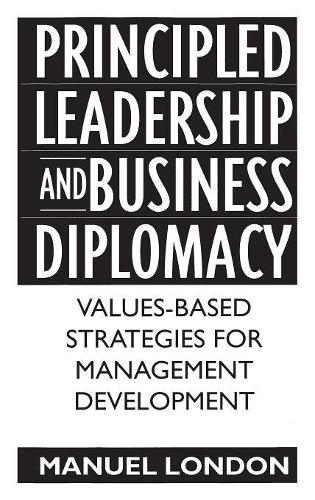
Principled Leadership and Business Diplomacy: Values-Based Strategies for Management Development
(Hardback)
Publishing Details
Principled Leadership and Business Diplomacy: Values-Based Strategies for Management Development
By (Author) Manuel London
Bloomsbury Publishing PLC
Praeger Publishers Inc
30th October 1999
United States
Classifications
Professional and Scholarly
Non Fiction
Personnel and human resources management
Business ethics and social responsibility
658.406
Physical Properties
Hardback
192
Description
Principled leadership is the art of applying ethical business values, and business diplomacy is the means of doing it. London shows that principled leadership and business diplomacy not only provide direction for management, but they also enhance development of leadership in others. His book offers a solid, well-illustrated, immediately applicable way to design a management and leadership development program, select training managers and executives, and a way to change corporate cultures. Concise and practical, his book is as important for teachers and their college-level students as for HR executives, management and organizational development specialists, and consultants throughout the public and private sectors. London shows how principled leadership and business diplomacy enhance employee and customer loyalty and commitment, essential to the survival of any organization in today's competitive, global economy. But, can this really be achieved London defines principled leadership as the art of applying ethical business values, and business diplomacy as the means to do it. By using these techniques, executives and managers can implement change and gain commitment to their initiatives from inside and outside their organizations. Well illustrated with case studies and exercises, this book is essential for HR executives, management and organizational development specialists, and consultants throughout the public and private sectors. London describes how principled, diplomatic leaders and managers put personal feelings aside, avoid anger, and by doing so are highly successful in resolving conflicts. He identifies and explains different styles of diplomacy, such as the trial balloon, shuttle diplomacy, coalitions, and co-optation, and shows how principled, diplomatic behaviors result when people really listen to each otherand by doing so, develop their own values as a foundation for decision making, conflict resolution, and negotiation. The result is a clear demonstration of how human resource managers, trainers, and organizational development consultants can create a truly productive work environment in their own organizations, and how principled leadership and business diplomacy will benefit them as well their relationships with others.
Reviews
London is to be commended for his idealistic vision, encouraging business professionals to be role models of principled diplomatic leadership.-Personnel Psychology
"London is to be commended for his idealistic vision, encouraging business professionals to be role models of principled diplomatic leadership."-Personnel Psychology
Author Bio
MANUEL LONDON is Director of the Center for Human Resource Management, and Professor, at the Harriman School for Management and Policy, State University of New York, Stony Brook. Prior to this, he worked for 12 years in a series of human resource and training department assignments at AT&T. London has written more than 80 articles and is author or editor of more than 16 books, including three published by Quorum: Career Development and Human Resource Strategies (editor, with E. M. Mone, 1988), Human Resource Forecasting and Planning for the Twenty-First Century (editor, with E. Bassman and J. P. Fernandez, 1990), and Human Resource Development in Changing Organizations (with R. A. Wueste, 1992).
